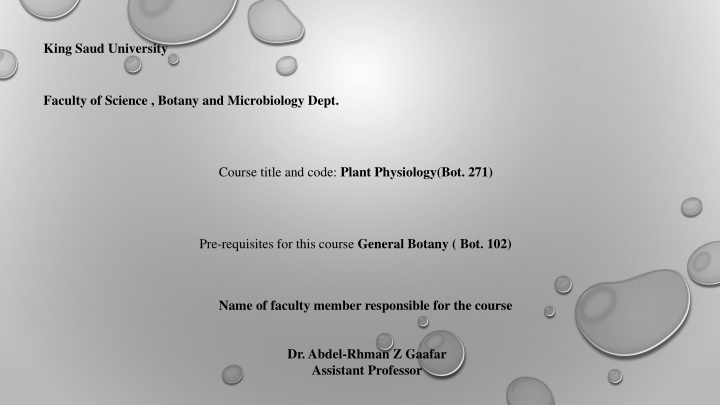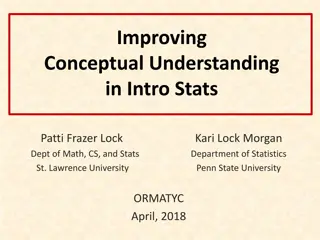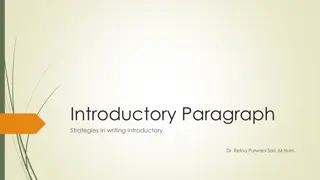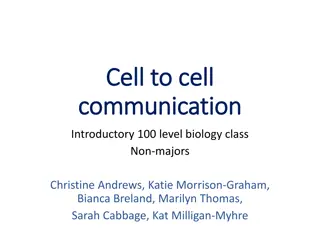
Plant Physiology: Exploring Cell Functions and Metabolism in Botany
This course in Plant Physiology (Bot. 271) at King Saud University delves into the intricate functions of cell components, water relations, mineral nutrition, phloem transport, photosynthesis, and more. Taught by Dr. Abdel-Rhman Z. Gaafar, students will gain insights into the complex world of plant biology, including topics such as phytohormones, protein metabolism, and growth regulation. Through lectures, exercises, and practical sessions, students will develop a deep understanding of plant physiology and its practical applications in botany and microbiology.
Download Presentation

Please find below an Image/Link to download the presentation.
The content on the website is provided AS IS for your information and personal use only. It may not be sold, licensed, or shared on other websites without obtaining consent from the author. If you encounter any issues during the download, it is possible that the publisher has removed the file from their server.
You are allowed to download the files provided on this website for personal or commercial use, subject to the condition that they are used lawfully. All files are the property of their respective owners.
The content on the website is provided AS IS for your information and personal use only. It may not be sold, licensed, or shared on other websites without obtaining consent from the author.
E N D
Presentation Transcript
King Saud University Faculty of Science , Botany and Microbiology Dept. Course title and code: Plant Physiology(Bot. 271) Pre-requisites for this course General Botany ( Bot. 102) Name of faculty member responsible for the course Dr. Abdel-Rhman Z Gaafar Assistant Professor
Course number and code: BOT 271 Course title: General Plant Physiology Effective hours: 4 (2+0+2) (Lect. Exer. Pract.) Functions of cells components Water relations, minerals nutrition, phloem transport. Amino acids, proteins and enzymes. Photosynthesis, transpiration, metabolism of N, S, lipids and aromatic compounds. Growth and differentiation. Phytohormones, Photomorphogenesis, biological clock, photoperiod, vernalization and physiological stress.
OBJECTIVES 1. What is the main purpose for this course? Understanding the functions of cell components. Solution Types. Colloid solutions specifications. Osmosis , Diffusion. Water Relations . Phloem Transport. Active Transport. Mineral Nutrition. Phytohormones. Proteins, Nitrogen, Carbohydrates, Lipids, Amino acids and Enzymes . Photoperiods and Vernalization. Photomorphogenesis. Light and dark reactions of Photosynthesis. Respiration.
List of Topics No. of Weeks Contact hours Introduction of the course ,Understanding the functions of cell components . 1 2 Solution types: True solutions, Suspensions ,Emulsions, colloids. Plasma membrane types: Osmosis , Diffusion, factors affecting the rate of water and mineral diffusion through semi-permeable and permeable membranes. Water Relations: water absorption, factors affecting absorption. Transport of xylem sap: root pressure, cohesion and adhesion, transpirational pull. Stomata and transpiration, Donan equilibrium Phloem Transport, Active transport. Mineral Nutrition: macronutrients and macronutrients. Phytohormone and Growth: Gibberillins, Cytokinins, Auxins, Abscisic acid. 2 2 4 4 1 1 2 2 1 1 2 3 2 2 4 6 Nitrogen metabolism, Amino acids proteins, lipids and Enzymes. 2 4
Code # 1.0 NQF Learning Domains And Course Learning Outcomes Knowledge Course Teaching Strategies Course Assessment Methods - studying the basic components of the protoplasm of the cellular organelles and its relation with the colloids. - Explain the properties of the different solution types. - Explaining difference between osmosis ant diffusion. - Transport of water and minerals in the plant cell: phloem transport, xylem transport, active transport. - the updating of research in the field - Student reports . - Mid terms and 1.1
- Comparison of the physiological role of of the different macro- and micro- nutrients in plant cells. - The physiological characteristics and roles of the growth hormones in the plant cells. - An introduction to carbohydrates, lipids, proteins, amino acids, enzymes. - Metabolism: Photosynthesis and Respiration. - Awareness with research update. - Assigning topics to student to search for topics related to the course in the internet and library. Cognitive Skills - Writing reports . - laboratory practical. Final exams of lectures and lab. - Quizzes and lab reports. 1.2 2.0 - Ability to collect the data that helping to gain more information about specific subject. - Learning more about using the library system. International and recent references in teaching. -Mid terms and final exams. 2.1 - . - Learning more about Internet. - Using the advanced tools for teaching . H.W. using Internet. -Research reports.. 2.2 - Using new visual tools in teaching
3.0 Interpersonal Skills & Responsibility - Gettingexperience from international researchers in the field of plant physiology.. Updating the scientific materials. - Conducting groupexperiments and writing group reports. - Deep application in software programs. - Working in groups. 3.1 Communicate result of the work to others. - Home work related to the recent researches. - Student evaluation by teacher 3.2 - Submitting oral reports during the laboratory sessions. 4.0 Communication, Information Technology, Numerical - Analysing the experimental data statistically. - Deep application in software programs . Assignements of references in the field. Report writing. 4.1 - -Using new visual tools in teaching - Report writing. Incorporating the use of the computer in the course requirement. Evaluating the laboratory written reports. 4.2




















